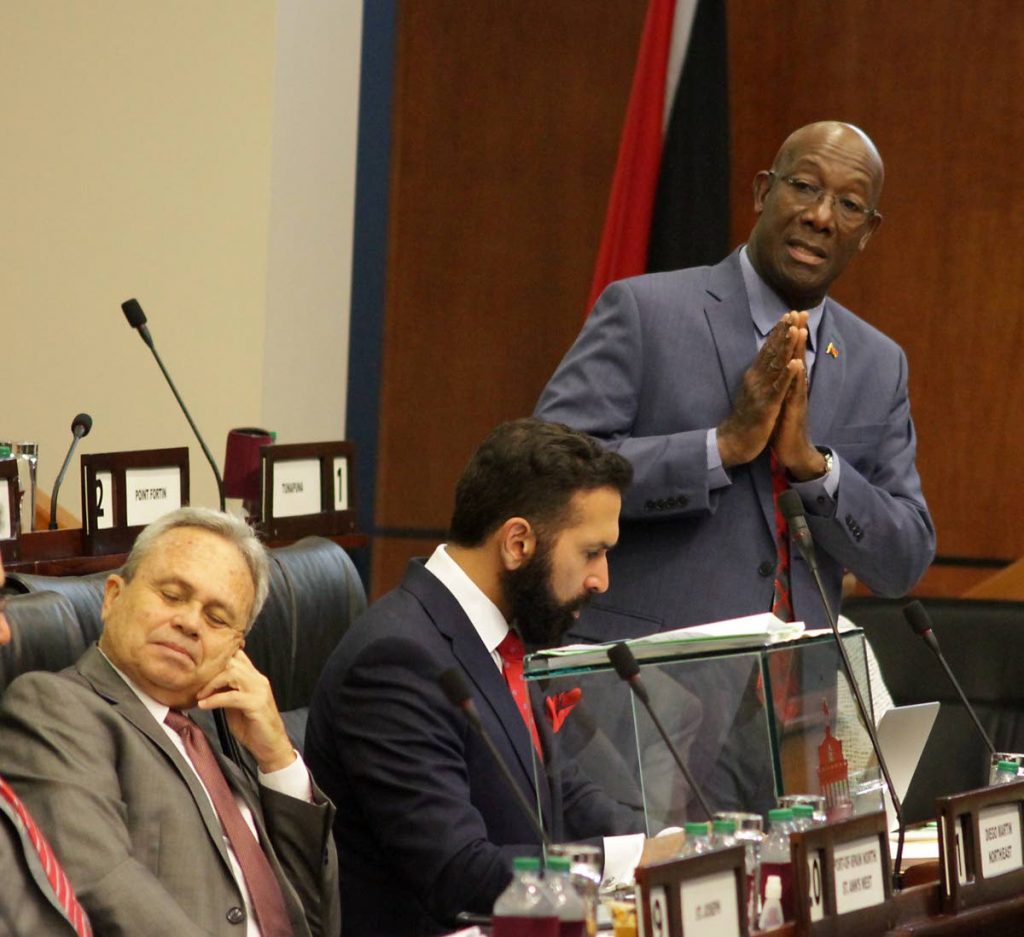COLM: ECONOMY RECOVERING

FINANCE Minister Colm Imbert promised good news and his mid-year review of the 2018 Budget delivered that.
A passionate Imbert hit back at his detractors — especially those in the Opposition — who criticised his handling of the economy, citing figures suggesting a corner had been turned and after years of economic recession and stagnation, “from all indicators we are on the road to economic revival.”
“We are moving into an era of macro-economic stability which is now underpinning our recovery,” Imbert said. He cautioned however that the country is still not yet out of the woods as core revenue from taxation was “fragile” at $40 billion to fund a $50 billion economy.
As expected, Imbert was eager to share revised outlooks on TT’s economic performance which improved since the year before, buoyed by increased natural gas output in the latter half of last year and expected to be sustained by projects scheduled to come on stream later this year and beyond.
This second half bump also led to an adjusted gross domestic product for the country by nine per cent, to $168 billion. This also will have improved the country’s economic performance last year, from -2.6 per cent growth to -1.0 percent. Imbert was clear that this would then have also improved the country’s debt to GDP ratio to well below 60 per cent, even factoring current plans to borrow.
The country’s financial buffers were also at healthy levels, he said, with foreign reserves at the Central Bank rebounding at the end of April to $8.11 billion, after dropping below $8 billion in March to US$7.98 billion — the lowest point in a decade.
The Heritage and Stabilisation Fund, was also robust despite withdrawals, he said, standing at US$5.87 billion at the end of April. He was once more adamant that it was the government’s prudent macroeconomic and monetary policies that have allowed growth to take place in an environment of low inflation. With headline inflation at 1.3 percent, TT’s inflation rate was well below other oil producing countries like Libya, Egypt and Nigeria.
“Our economic recovery is thus taking place in an environment of price stability, and as a result of our policies, we expect growth without high inflation, which is the most desirable outcome,” he said. The energy rebound though, remained the driving economic factor.
“With average gas production at significantly higher levels, up 20 per cent from the 2016 levels, we have revitalised the energy sector,” he said, giving credit to a team headed by Prime Minister Dr Keith Rowley for spearheading negotiations and relations with energy companies that, in turn, led to boosted production. “The energy sector is well poised to meet the demands of the downstream sector over the near-term horizon thereby supporting our medium-term growth recovery. Further ahead, access to additional gas from Venezuela will generate substantial opportunities for strengthening and supporting our economy,” he said. Increased activity in the energy sector has had a knock-on effect on growth in non-energy, resulting in a break-even position for 2018, and growth into 2019 and 2020.
The government has also increased its revenue collection in the non-oil sector, including corporation taxes from financial institutions.
Perhaps the biggest announcement, though, was the initial public offering for shares in the National Investment Fund (NIF), which Imbert said would happen next month. Earlier this month, the government recouped some of the debt owed to it from the $23 billion it spent on the Clico bailout, when the Clico Investment Fund repaid some $4 billion in shares from Republic Financial Holdings Ltd, as well as $6 billion worth of other assets. Imbert said the government will offer 49.9 per cent of the total value in its NIF IPO, with the objective to “monetize the assets of the Fund and realize our projected capital revenue by the end of July 2018.”
Imbert ended his presentation following the trend he started in October, where he quoted calypsonian Black Stalin that, if country worked together, “We can make it if we try.” This time though, his sentiment was more positive, as he quoted American reggae artist Johnny Nash’s song, “I can see clearly now, the rain is gone.” “If I am allowed some artistic license,” Imbert said, “Under this PNM Government, it’s going to be a bright sun-shining day. ”


Comments
"COLM: ECONOMY RECOVERING"